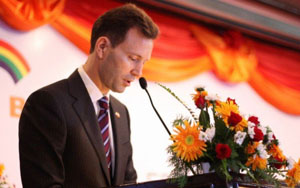There aren’t many business leaders in Asia who will turn down an offer to discuss the growth potential of Myanmar. Emerging from the shadows of five decades of direct army rule and taking steps towards democracy, it has been a buzz word for well over a year now, not just in the region, but around the world. Its opening up has attracted the attention of governments and corporations worldwide.
 This week’s WEF meeting is perhapsthe highest profile international forum in the country since the lifting of US and European sanctions enabled companies to invest in Myanmar for the first time in 15 years.
This week’s WEF meeting is perhapsthe highest profile international forum in the country since the lifting of US and European sanctions enabled companies to invest in Myanmar for the first time in 15 years.
With an economy predicted to grow by as much as 8% per year over the next decade with the right mix of reforms, economic management and regional trade integration with neighbors like China and India, there is a huge level of anticipation in the business community for what is essentially one of the last true “frontier” markets in Asia – a virgin market of 64 million people.
Myanmar’s future looks incredibly bright: the Economist Intelligence Unit’s (EIU) most recent report on the country says its economy will strengthen further by 2017/18 off the back of large projects funded by investors from China, South Korea and Thailand in sectors such as power, petroleum and infrastructure.
In other sectors, there is a bold ambition in tourism to genuinely rival Thailand as Southeast Asia’s tourism hubis huge: Myanmar is targeting 3 million tourist arrivals by 2015 - a near tripling of the 2012 figure -as part of its Tourism Master Plan, which it will present at the WEF meeting this week.
Its citizens, too, show aspirations to travel more as the country opens up: our travel research showed they spend on average US$230 per person on domestic leisure trips, while the average amount spent on international trips is about six times higher.
All signs were positive ahead of this historic WEF meeting: new market reforms are creating opportunities for home-grown business; multinationals can now invest in Myanmar now that sanctions have been lifted; newspapers have moved from weekly circulations to daily; and banks are now starting to offer services we take for granted such as ATMs and card payments (debit and prepaid first, credit will come a little later),a staggering development for an economy which until a year ago was 100% cash-based.
On the ground you can still see banks literally processing bales of cash on their premises. That tells a story in itself:Myanmar has a long way to go in order to fully integrate with the global financial system and it seems self-serving to talk up the opportunities without weighing up the enormouschallenges the country is facing.
Its future growth and development still very much depend on the speed and quality of economic reform, and on that subject there are no certainties: the ADB says thecurrent reforms have stimulated growth and confidence but momentum needs to be maintained and deepened for an extended period of time. This will require a wholesale upgrade of public sector capabilities from legislative frameworks, to specific processes across all aspects of government, a Herculean task for a country that has been closed off from the rest of the world for more than a generation. While the intentions are positive, the devil is in the details.
Many global firms, like ours,are volunteering to help the government to address manpower shortages and offer consulting support. How much support is needed? That is a moot point, but as much as is required to build its basic infrastructure. There are millions of people in Myanmar who lack the skills or access to even basic services to share the benefits of the country’s rapid evolution. Being a cash-based economy, only an estimated 2% of people currently have a bank account;mobile phone penetration is marginally higher, and only 13% of its people in 2009 had access to mains electricity, according to the World Bank.
The NGO Mercy Corps runs interactive workshops in Myanmar now for women – the household budgeters – where they learn critical business and financial literacy skills. It’s believed that teaching things like cash-flow analysis, book keeping and basic accounting can empower historically poor people with the tools to succeed. Such business literacy can in turn allow families, farmers and micro-entrepreneurs to fully participate in the new economy.
Inclusion – both digital and financial – will allow Burmese citizens to access the services and resources needed to participate in the emerging economy. That will only happen when a reliable, robust and scalable ICTinfrastructure is in place, which could feasibly help Myanmar leapfrog technologies and become a completely mobile-empowered nation.
This is not a challenge to be underestimated, and a similar challenge exists in virtually every segment of its economy. Businesses looking to succeed will need to take a long term commitment: to consult, educate, assist and execute with both local public and private partners in Myanmar over a sustained period of time.
It shouldn’t be forgotten what big strides Myanmarhas taken in the last year alone – astonishing achievements – but make no mistake the road ahead will be tough for those businesses that are in for the long haul.
Matthew Drive is the Southeast Asian President of MasterCard Worldwide, and one of the speakers at the World Economic Forum on East Asia in Naypyitaw from June 5-7, 2013.


